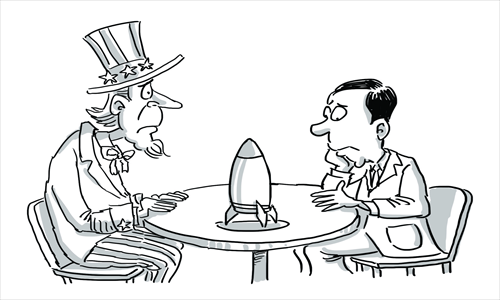Korean crisis hints at future Sino-US ties

Whether China desires it or not, it now faces up to a cold reality; the world is looking at how China behaves and wondering whether its China's rise is good for the world, or represents a looming threat as some pessimistic realists argue. The most important bilateral relationship for China's national interest is with the US.
And for the next 10 years, managing this relationship will be Beijing's foremost foreign policy challenge. Chinese policymakers must puzzle out whether the US will try to use its power to curtail a puzzling future.
How this relationship will unfold in the next decade is still uncertain. But the security crisis on the Korean Peninsula in the last two months gives us a glimpse of what may come in the future.
In deterring North Korea's bellicosity, Washington and Seoul joined together and conducted joint military exercises recently to showcase how strong the alliance stands together and how credibly Seoul will be supported by US extended deterrence. The military posture may have contributed to temporarily halting Pyongyang's aggressive behavior.
China did not criticize the US-South Korea military drills but maintained a prudent stance while supporting the UN sanctions on North Korea. China also promoted the idea that the denuclearization process be continued through the Six-Party Talks. On the surface, it neither confronted the US nor punished North Korea.
China has been the key actor curtailing North Korea's nuclear ventures, sustaining North Korea's falling economy, constructing the Six-Party Talks and contributing to the stability of the Korean Peninsula.
However, as the last few months showcased, North Korea's nuclear politics have created a grim reality, demonstrating how fragile the security of the Korean Peninsula is. Moreover, Pyongyang's bellicosity has helped bolster the US pivot to the Asia-Pacific.
B-2 and B-52 bombers and stealth F-22 Raptors, which flew over South Korea's airspace during the recent joint exercise, represent a signaling to the North of the US deterrence commitment and its pivot to the Northeast Asian strategic theater where the US must face a rising China as well.
Whether the last couple of months of security crisis in the Korean Peninsula was totally unusual still remains to be decided.
However, what was definitely out of the ordinary is that everyone was paying attention to how Beijing would deal with Pyongyang and Washington. The last two months of security crisis may provide clues as to what role China can play and how it can settle its relations with the US.
The last couple of months attest that China may assume a very important role as regional stabilizer.
Beijing did not overreact to what happened. While demanding North Korea back down, it also promoted peace and stability in the region. Washington and Seoul demanded that Beijing influence Pyongyang. One thing is certain: If the Obama administration either engages or contains Pyongyang, it will have to gain cooperation from Beijing for its efforts to be successful. Washington cannot draw Pyongyang to a constructive round of nuclear talks without Beijing's assistance on the sideline.
On the other hand, this means that Beijing cannot just do nothing; it has to implement actual policies that calm down Pyongyang and bring North Korea back to the denuclearization process.
Beijing does not want the US to exercise its pivot policy in the Korean Peninsula. Real progress in the Sino-US relations will be more likely if Beijing and Washington are in sync over the Korean Peninsula.
Both must be committed to a peaceful denuclearization of North Korea through either bilateral or multilateral approaches.
Any military contingencies on the Korea Peninsula will destabilize Sino-US relations and bring about a devastating tsunami striking global stability.
Both must be also able to work together and help the two Koreas come up with a peace regime on the Korea Peninsula and acknowledge that peace and stability on the peninsula is detrimental to whereabouts their relations may unfold for the times to come.
Both powers share identical interests that contribute to constructing a cooperative relationship over the Korean Peninsula.
The author is an associate professor at the Department of Political Science, Yonsei University, Seoul. opinion@globaltimes.com.cn